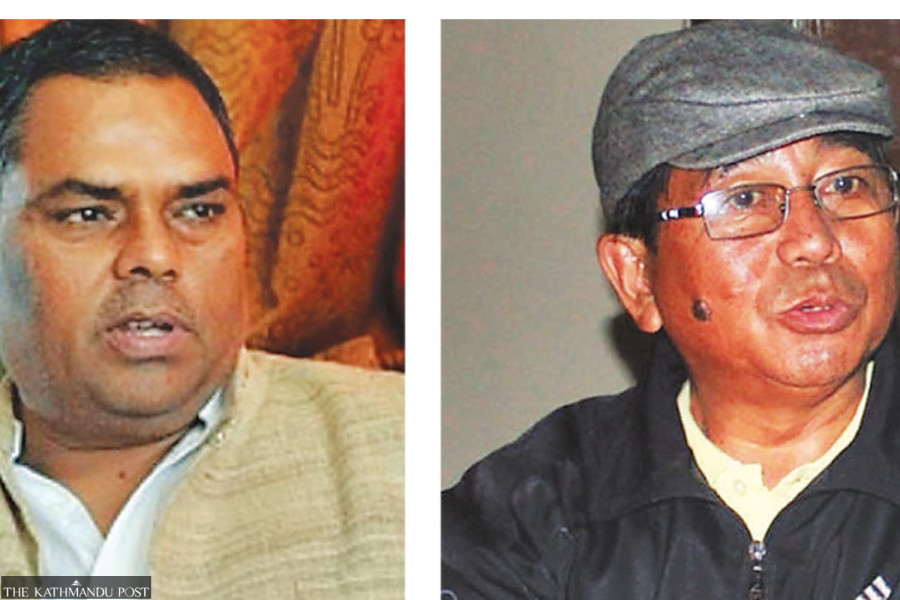Politics
Ashok Rai’s grip on Janata Samajbadi Party loosens
The party elected Ram Sahaya Prasad Yadav, a confidant of chair Upendra Yadav, its parliamentary party leader, dashing Rai’s hopes.
Nishan Khatiwada
The Janata Samajbadi Party, on Wednesday, elected Ram Sahaya Prasad Yadav as its parliamentary party leader.
Following the surprise defeat of party chair Upendra Yadav from Saptari-2 in the November 20 polls, many leaders were in the race for the parliamentary party leader. Some of the aspirants were Ashok Rai, Nawal Kishore Yadav, and Raj Kishore Yadav.
But the party unanimously elected Ram Sahaya Prasad Yadav, a confidante of chair Upendra Yadav. Rai, second to the party chair in the hierarchy, was expected to become the parliamentary party leader after securing victory in Sunsari-1.
However, the party chair chose Ram Sahaya Prasad Yadav. If recent developments are anything to go by, Rai, despite holding a powerful position in the party, lacks support base in decision making in the party committee. Support for him in the party is debilitating, and he has apparently been cornered.
Observers cite a perception prevalent in the party that the voter base is concentrated in Madhesh, for his weakening grip. A Madhesh observer, Sohan Sha, said: “A perception prevails in the Janata Samajbadi Party that if the voter base is centralised and concentrated in Madhesh, why elect the Pahadi leaders to the coveted posts.”
According to Sha, many Madhesh-based leaders in the party say that the non-Madheshi leaders such as Rai are getting more benefits than the voter base they command.
Sha further added, “Madheshi leaders in the party fear that handing over the posts to non-Madheshi leaders will weaken them and they will lose voters.”
The party had even formed a three-member election committee for the election of the parliamentary party leader. But only Ram Sahaya’s candidacy was filed. Upendra Yadav was facing immense pressure in the party not to choose a leader from the Pahadi community, and he opted for his long time confidante, Ram Sahaya Prasad Yadav.
Ajambar Rai Kangmang, who is currently a central committee member of the Maoist Centre, worked together with Ashok Rai for many years in CPN-UML and supported the latter to split the CPN-UML and to form a new party—Federal Socialist Party—under Rai’s leadership in 2012. He said: “Upendra Yadav did not allow Ashok Rai to become the parliamentary party leader. Yadav’s strategy is to elect Ram Sahaya as Vice President and contest the by-election from Bara-2 to become the parliamentary party leader.”
If a member of parliament is elected as the country’s President or Vice President, the lawmaker should resign from the post and the seat goes vacant, requiring a by-election in the constituency.
A senior leader of Janata Samajbadi Party Rakam Chemjong, however, said that Ashok Rai did not show interest to contest for the post. “It is not true that he is cornered. The party went through a process. He agreed not to contest for the post and to elect Ram Sahaya Prasad Yadav the parliamentary party leader.”
“It is not a big deal though. He is the chair of the party’s Federal Council, which in itself is a respectable post,” Chemjong said.
Rai is a seasoned politician with a strong political background.
He was elected in 1990 and 1994 elections from Khotang as a UML candidate. Over 500 leaders belonging to traditionally marginalised groups quit the UML in October 2012. The dissidents were led by the former vice chairman of the party, Ashok Rai.
Rai and others were upset with the UML leadership over identity issues. The group formed the Federal Socialist Party Nepal. Many leaders who had accompanied Rai are still with him while many have parted ways.
Rai’s recent cosiness with the UML has been evident in his recent political activities.
In the last month’s polls, the UML’s assistance came in handy for him. He was elected to the House of Representatives from Sunsari-1 with UML’s support. “Rai won with UML’s votes in rural areas. Otherwise, he wouldn’t have,” said Kangmang.
The Madhesi Janadhikar Forum-Nepal (MJF-N), the Federal Socialist Party Nepal (FSPN) and the Khas Samabeshi Party officially merged on June 15, 2015 to form the fifth-largest party in the second Constituent Assembly (CA).
The Sanghiya Samajbadi Forum-Nepal (SSFN) was announced under the leadership of MJF-N Chairman Upendra Yadav, after the merger. It was claimed to be a common platform of pro-federal and ethnic identity-based forces.
Later, former prime minister Baburam Bhattarai merged his Naya Shakti with Sanghiya Samajbadi Forum Nepal in 2019 to form the Samajbadi Party Nepal.
The party until now has had repeated splits.
Leaders who have previously worked with Rai see a lack of leadership quality in him.
Kangbang said: “Rai lacks the quality to be the first and number one leader. He only has the quality to be the second or third to a certain leader.”
Political analysts see the monopoly of Upendra Yadav in the party where only his yes-men have a future.
“The chair has a strong grip on the party. If leaders talk about logic and principles, they will not get space as was evident from the series of new entrants and defectors of the party. Rai also has become a victim due to Yadav’s monopoly,” said Tula Narayan Shah, a political analyst.




 16.12°C Kathmandu
16.12°C Kathmandu














